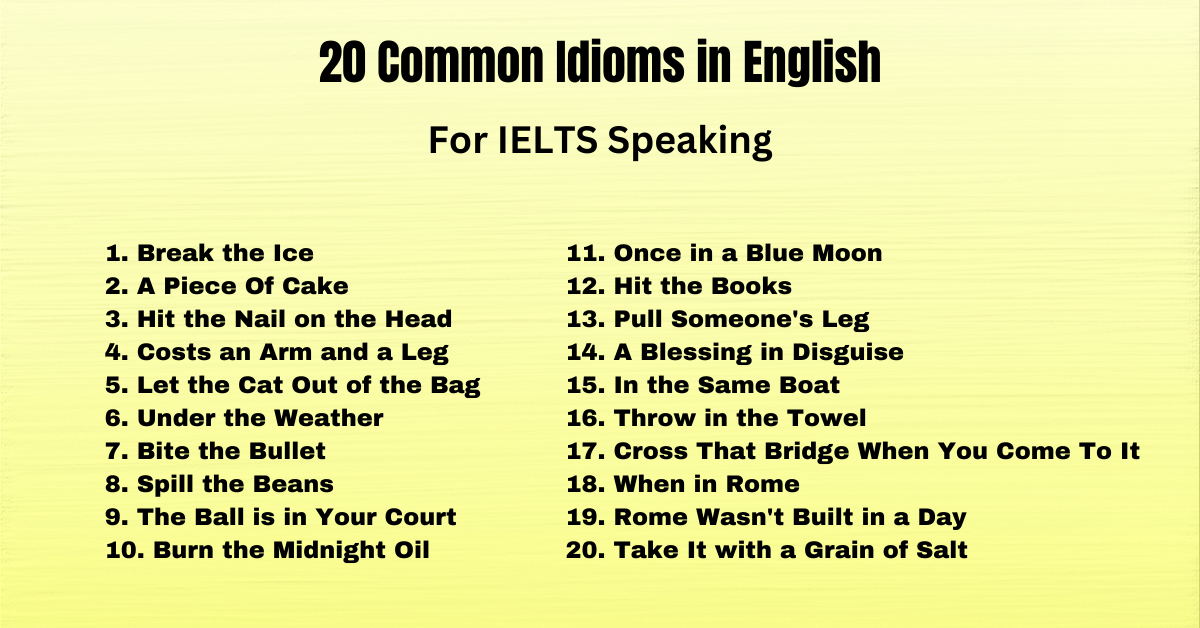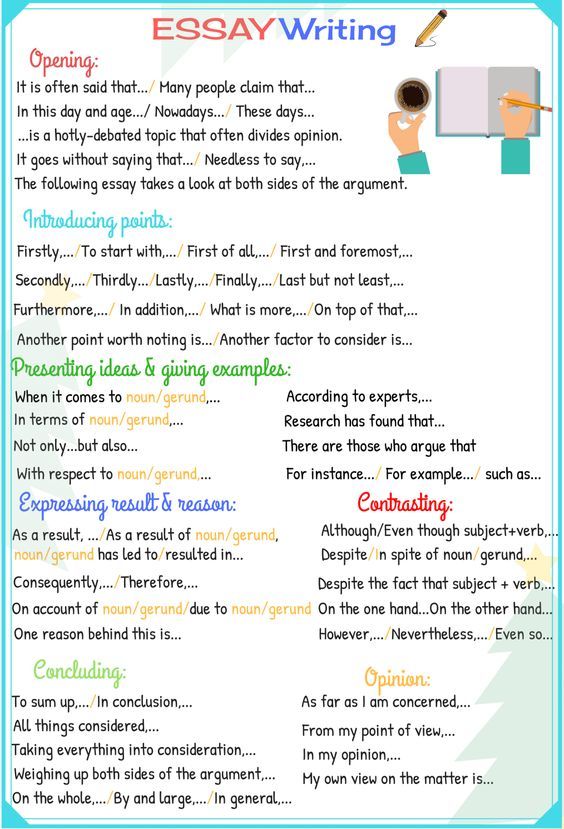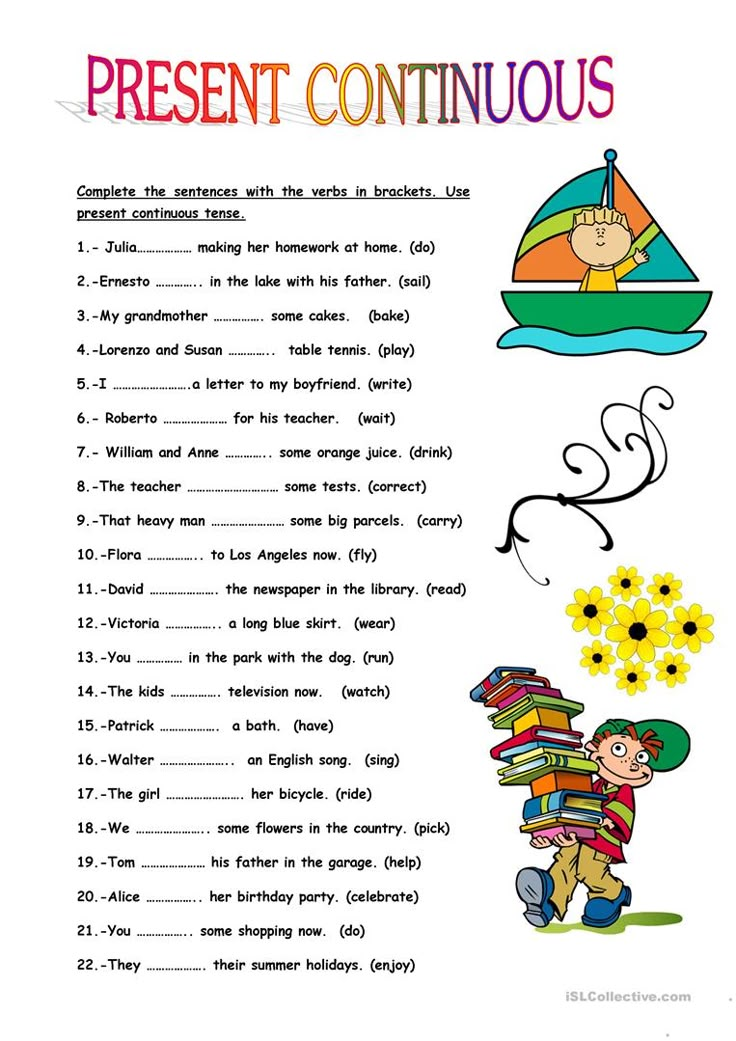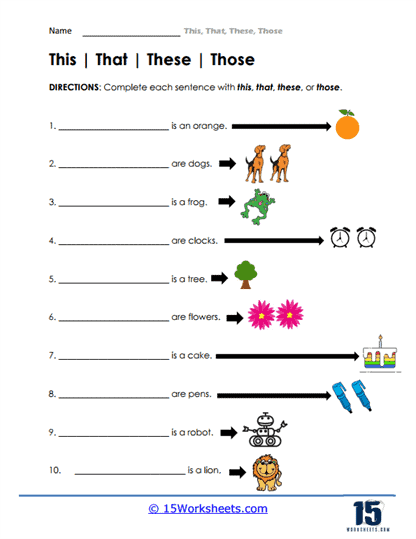20 English Idioms
Have you ever been puzzled by a phrase like “kick the bucket” or “spill the beans”? English idioms can be both fascinating and confusing.
They’re the secret sauce that adds flavor to everyday conversations, making language vibrant and engaging. But, if you’re not familiar with them, they can leave you scratching your head. Imagine impressing your friends and colleagues with witty expressions that make you sound fluent and confident.
Understanding idioms not only enriches your vocabulary but also enhances your ability to express yourself creatively. You’re about to discover 20 English idioms that are not just words but stories and cultural nuggets that bring the language alive. Get ready to unravel the meanings and origins of these intriguing phrases, and watch your communication skills soar!

Credit: www.wordscoach.com
Common Idioms And Their Meanings
Many idioms come from old stories. “Spill the beans” comes from ancient Greece. People voted by using beans. A spilled jar showed secrets. “Bite the bullet” began in wartime. Soldiers bit on bullets during surgery. They had no pain medicine. “Break the ice” started with old ships. Ships broke ice to start journeys. Each idiom has a story. These stories make them special.
Idioms show how people think. They reflect culture and history. “The ball is in your court” is from sports. It shows responsibility. “Hit the nail on the head” means being correct. This idiom talks about precision. Idioms can be funny or wise. They help people understand each other. They make language lively and colorful.
Idioms In Everyday Language
Idioms make conversations fun and lively. They help people express ideas quickly. For example, “break the ice” means to start a talk. It is a way to make people comfortable. “Hit the nail on the head” means getting something right. Idioms can make speech colorful. They show how people feel. “Under the weather” means feeling sick. Kids use idioms without knowing it. “Piece of cake” means something is easy.
Idioms can sometimes be confusing. Not everyone knows their meaning. It can lead to misunderstandings. Some idioms are old-fashioned. People might not use them anymore. It’s good to learn idioms. They help in making speech interesting. Idioms show cultural knowledge. They reflect how people think.
Idioms Across Different English-speaking Regions
British and American English have many differences. Idioms are a big part of this. In the UK, people say “It’s raining cats and dogs.” This means it’s raining a lot. In the US, they say “raining buckets” for the same thing.
Americans might say “hit the books” for studying hard. In Britain, they might say “swot up.” These are just a few examples. Regional expressions make English rich and fun. Learning them helps understand cultures better.
Different regions have unique sayings. In the south of the US, “bless your heart” is common. It can mean many things. Sometimes, it’s kind. Other times, not so much. In Australia, people say “flat out like a lizard drinking.” It means very busy. These expressions add local flavor to language. They show how people live and think. Knowing them makes conversations more interesting.

Credit: www.tiktok.com
Idioms In Literature And Media
Idioms make stories come alive. They add color to words. Authors use idioms to show feelings. Idioms help readers understand characters better. They make the story more interesting. Idioms are like secret codes. Readers feel smart when they get them. Stories become fun with idioms. They make readers think and feel.
Movies use idioms all the time. Characters use them in dialogues. Idioms show how characters are feeling. They make scenes funny or sad. TV shows use idioms to connect with viewers. Idioms make shows exciting. Viewers enjoy guessing idioms’ meanings. They feel more engaged with the story. Idioms help viewers enjoy shows more.
Learning Idioms As A Non-native Speaker
Understanding idiomscan be tough for non-native speakers. Idioms often don’t mean what they say. They use words in a tricky way. A phrase like “break the ice” can confuse. It means to start a conversation, not to break ice.
Learning takes practice. Listen to people who use idioms. Try using them in daily talk. Reading books with idioms helps too. Use a dictionaryto know meanings. Ask friends about idioms. They can explain it simply.
Keep a journal of new idioms. Write them with meanings. Try drawing a picture of what the idiom means. This helps you remember. Practice speaking with friends. Use idioms in sentences. This boosts your confidence.
Online coursesare great for learning idioms. Many websites offer lessons. They teach meanings and usage. Some apps have games with idioms. You learn while having fun. Books about idioms are useful too. They give examples and meanings.
Join clubs that discuss idioms. They often have native speakers. You can ask questions and get answers. Watch English movies and shows. Listen to how actors use idioms. It helps you understand better.
Idioms And Their Evolution
English idioms can change over time. “Spill the beans” once meant to mess up. Now it means to reveal a secret. “Kick the bucket” used to mean to end something badly. Today, it means to die. Meanings shift as people use words differently. Languages grow like this. It is natural. Old idioms may seem strange now. New meanings make them fresh.
New idioms emerge every day. “Break the internet” is popular now. It means something online gets huge attention. “Ghosting” means not replying to messages. Modern life creates fresh sayings. Social media helps them spread quickly. New idioms reflect changes in society. They show how people connect. Words evolve as people do.
Fun Ways To Practice Idioms
Playing games is a fun way to learn idioms. Try charades with idioms. Act out the phrase without speaking. Friends guess what idiom you mean. This helps remember idioms easily. Another game is “Idiom Bingo”. Fill bingo cards with idioms. As you hear them, mark your card. The first to complete a line wins. These games make learning fun and interactive.
Writing stories using idioms can be engaging. Use idioms to make stories lively. Swap stories with friends. Read and enjoy each other’s creativity. Another exercise is drawing idioms. Draw pictures to show the meaning. This helps connect images to phrases. These exercises keep learning enjoyable and creative.

Credit: www.pinterest.com
Frequently Asked Questions
What Are Common English Idioms?
English idioms are expressions with meanings different from their literal words. They are widely used in conversations. Idioms can add color and depth to language. Examples include “break the ice” and “spill the beans. ” Understanding idioms can improve communication skills.
How Can Idioms Enhance Language Skills?
Idioms add expressiveness and cultural context to language use. They help in understanding native speakers better. Using idioms can make your speech more engaging and relatable. They also enrich vocabulary and comprehension. Mastering idioms is beneficial for effective communication.
Why Are Idioms Important In English?
Idioms are important for understanding colloquial speech and writing. They provide insights into cultural nuances. Idioms often convey emotions and attitudes concisely. Knowing idioms enhances comprehension of media and literature. They are essential for fluent and natural communication.
How Can I Learn English Idioms Effectively?
Start by reading books and watching English movies. Practice using idioms in conversations. Keep an idiom journal for reference. Engage with native speakers to understand context. Online resources and idiom dictionaries can also be helpful. Consistent practice is key to mastering idioms.
Conclusion
Idioms add color and depth to English conversations. They make language more lively and relatable. Understanding idioms can improve your communication skills. You can express thoughts more creatively. Practice regularly to become familiar with them. Use idioms in everyday speech.
It helps you connect with native speakers. Remember, each idiom has a story behind it. Enjoy exploring their meanings and origins. They are an essential part of English culture. Keep learning, and soon you’ll use them effortlessly. With time, these phrases will enrich your language experience.
Happy learning!






